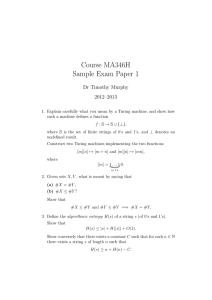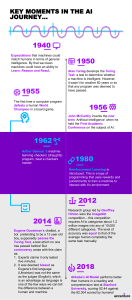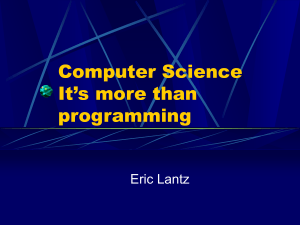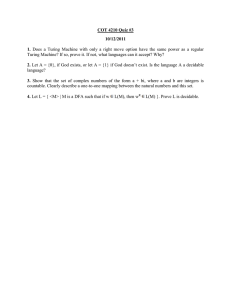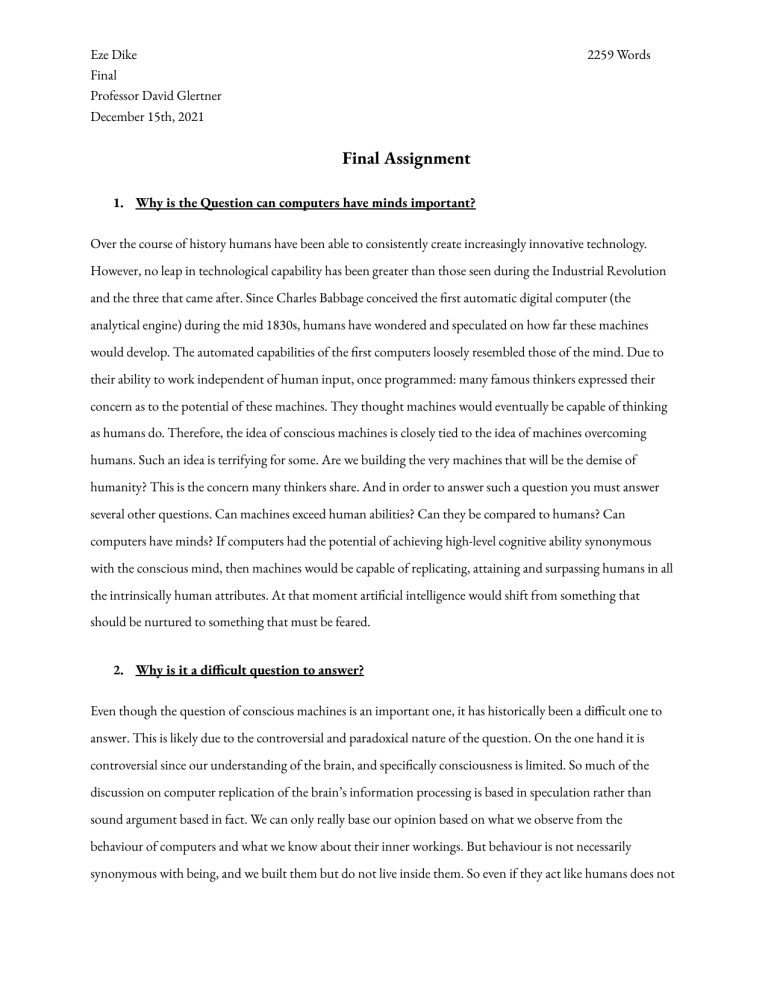
Eze Dike 2259 Words Final Professor David Glertner December 15th, 2021 Final Assignment 1. Why is the Question can computers have minds important? Over the course of history humans have been able to consistently create increasingly innovative technology. However, no leap in technological capability has been greater than those seen during the Industrial Revolution and the three that came after. Since Charles Babbage conceived the first automatic digital computer (the analytical engine) during the mid 1830s, humans have wondered and speculated on how far these machines would develop. The automated capabilities of the first computers loosely resembled those of the mind. Due to their ability to work independent of human input, once programmed: many famous thinkers expressed their concern as to the potential of these machines. They thought machines would eventually be capable of thinking as humans do. Therefore, the idea of conscious machines is closely tied to the idea of machines overcoming humans. Such an idea is terrifying for some. Are we building the very machines that will be the demise of humanity? This is the concern many thinkers share. And in order to answer such a question you must answer several other questions. Can machines exceed human abilities? Can they be compared to humans? Can computers have minds? If computers had the potential of achieving high-level cognitive ability synonymous with the conscious mind, then machines would be capable of replicating, attaining and surpassing humans in all the intrinsically human attributes. At that moment artificial intelligence would shift from something that should be nurtured to something that must be feared. 2. Why is it a difficult question to answer? Even though the question of conscious machines is an important one, it has historically been a difficult one to answer. This is likely due to the controversial and paradoxical nature of the question. On the one hand it is controversial since our understanding of the brain, and specifically consciousness is limited. So much of the discussion on computer replication of the brain’s information processing is based in speculation rather than sound argument based in fact. We can only really base our opinion based on what we observe from the behaviour of computers and what we know about their inner workings. But behaviour is not necessarily synonymous with being, and we built them but do not live inside them. So even if they act like humans does not Eze Dike 2259 Words Final Professor David Glertner December 15th, 2021 necessarily mean they are human, and even though we know how they are made we do not really know how they experience the world. On the other hand, for a machine to be conscious would mean that it is no longer a machine. If a machine was capable of more than it was built and programmed for it could no longer be considered as that, so the nature of the question is also quite absurd. 3. Choose either a) or b), depending on your point of view - b) Computers can’t have minds, yet some thinkers (computationalists) believe they can. Explain why they say so. As mentioned earlier, artificial intelligence has come a very long way since its inception. Today, humans are able to program computers to do things that were once unimaginable. This is due to the basic building blocks of computers, which functionally resemble those of the brain very closely. In The Perceptron: A Probabilistic Model for information storage and organization in the brain, Frank Rosenblatt writes “During the last few decades, the development of symbolic logic, digital computers, and switching theory has impressed many theorists with the functional similarity between a neuron and the simple on-off units of which computers are constructed ". The possibilities that stem from these very similarities has led many theorists to believe that there will come a time when humans will build machines, and equip them with the full set of capabilities of the human brain, through software programing. This is wrong. Though many parallels can be drawn between the computer and the brain, there are two major elements of cognition that are essential to what makes us human, which computers lack. No matter how much programming is done to the software, it will not give a computer the ability to think and emote. Humans have come to believe that thinking is the official measure which differentiates humans and all other beings. Renee Descartes famously wrote, “I think therefore I am,” meaning that someone who could engage in critical thought would have to be a conscious living being to do so. With this in mind, it is important to consider that there are important philosophical implications to the question of thinking machines, in addition to the empirical ones. In his paper, “Can Machines Think,” Alan Turing, famously stated that he believed there would come a time where machines would be able to think like humans. His statements are quite optimistic seeing as humans don’t have a clue how to go about combining technological advancements with the Eze Dike 2259 Words Final Professor David Glertner December 15th, 2021 concept of free thought. In order to speculate on whether or not computers will ever be able to think for themselves, as humans do, we must deeply reflect on human nature. Though much of the information vital to thought is processed by the brain subconsciously, humans are still conscious and thinking. We can think because we are conscious, not the reverse. Alan Turing asked himself whether machines were able to do the same, and devised a way to test it named the Turing Test. In short, A computer might be able to fool an unsuspecting human into believing that it is conscious, thinks and feels emotion, but the truth is that the success rate of the test is only high when computers answer the human questions with a “Yes” or “No” answer. Computers had a much more difficult time fooling the unsuspecting human when the test required conversational answers, therefore, the test does not prove much. John Searle argued that passing the Turing Test does not determine intelligence comparable to humans. Passing the Turing test only demonstrates a computer’s ability to imitate human behavior based on the way it was programmed. Programs like ELIZA have the ability to do so by manipulating symbols it does not understand fully. Additionally, machines lacking the ability to feel emotion is a very important consideration. Emotions are an essential aspect of human nature that thinkers, such as Turing, fail to take into account. As mentioned above, the Turing Test is really only meant to test the imposter’s ability to deceive not anything else. The test was adapted from a game where a person was meant to differentiate between a hidden man and woman, solely through script-based conversation. So the test is truly only testing whether a computer can give the impression of being a human rather than actually possessing human cognition. This is exactly where Paul Ziff finds contention with much of Turing’s work. It fails to factor emotion into the broader thinking of human beings, therefore it contains no real metrics for emotional intelligence. In Mentality in Machines, D. M. Makay points out that any test based on the observable activity of a human can be passed by automata. So the Turing test - and any other test which measures based on observable behaviors - is not at all an appropriate test to calculate a machine’s intrinsic likeness to a human being. Ziff goes even further by arguing that robots are simply mechanisms that can not - and will not - ever “feel” as living organisms do. And machines are sometimes capable of fooling humans because they are specifically designed by humans to fool other humans. “ No robot would act tired,” he writes. Then follows with, "Because a robot could only act like a robot programmed to act like a Eze Dike 2259 Words Final Professor David Glertner December 15th, 2021 tired man.” Really machines can only be as human as they were programmed to be, and such a reality is inhuman, in and of itself. For machines to truly eventually be synonymous with cognitive functioning, humans would have to figure out how to program consciousness into software. Consciousness is often defined as the ability to know and perceive. It is through consciousness that one becomes aware of the implications of their actions, as well as themselves in the moment. To understand the meaning behind actions, memories are necessary. Memories give humans the ability to attach context from the past to things they will do in the present. This ability is an important part of language and morality, which ultimately help make us human. Like humans, machines can store memories. But there are some important distinctions that must be made when comparing the brain to a computer. Though machines can recall memories at a much better rate than the human brain in much greater detail; the Neural Network that stores the memories within its Neurons must do so through an algorithm that is externally programmed. The individual neurons of the network do not know for what purpose they are being programmed. That is where computers differ from the human brain, and it is highly unlikely this difference will ever change. The human brain contains different independent components, some that operate on the purely abstract, some that operate on the specifically defined, and some that operate on both. When the brain is given multiple tasks, its neurons themselves adjust for how to solve or how to keep more than one mapping amongst the so-called “infinite neurons in the brain.” It is as though evolution has allowed human neurons to come pre-programmed to process information dynamically. This “pre-programming of the human brain” is what allows humans the ability to exercise free-will, which computers can’t. According to the Philosopher Adam Smith, “free will” is “being able to accept responsibility.”(Smith) Even if computer scientists were able to figure out how to equip a computer with software that enables random and arbitrary thoughts, whether it is through a set of random algorithms or some other means, and this computer processed information through simulated neurological pathways similar to a human brain, which enables it to think in a non-cyclical pattern. It would just be an imitation of the human brain and not its own original mind. It would still lack free will, and base its actions (output) on either syntax or an input. This is why John Searle brings up language in “ The Chinese Room” experiment. Computers will not ever really be able to Eze Dike 2259 Words Final Professor David Glertner December 15th, 2021 truly understand language, which is why Searle uses the experiment to oppose Turing’s views. A language consists of any number of valid sentences. Two things are necessary to assure the validity of any sentence: proper syntax and semantics. While syntax simply involves the grammatical structure of said sentence; semantics alludes to the meaning of the vocabulary symbols placed within the grammatical structure of the sentence. A computer will never truly understand why the sentence “apples sing gracefully” has no meaning, even if it is programmed to refuse the sentence. Semantics are out of the reach of computers, and will be forever. In summary, if machines had the potential to replicate, attain and surpass the human level of cognitive ability synonymous with the human conscious mind they would be feared. That is the cause of the interest so many have in their mental ability. We can only really attempt to understand the cognitive ability of machines through their inner workings and actions, but neither helps us to truly know if they are capable of human-like cognition. So the discussion is left to opinion and speculation. And it is my opinion that no matter how much innovation the field of programming sees, it will not give a computer the ability to think and emote. Humans will never be able to create a mind quite like our own and there is a large amount of evidence in support of this. Computers have emerged that are even able to learn on a curve similarly to the human brain. Even so, for an engineered inorganic machine to surpass the innate capabilities of the human mind means that such a mechanism could no longer be considered as a mere machine. As mentioned earlier, the “pre-programming of the human brain” is what allows humans the ability to exercise free-will, which computers can’t. Therefore, for a machine to engage in critical thought it would have to be a conscious living being. But that is not the case, machines are simply inanimate objects, designed to carry out the tasks we assign to them. That is why the Turing Test is a poor test and robots will never truly be able to comprehend semantics. Eze Dike 2259 Words Final Professor David Glertner December 15th, 2021 Citations Rosenblatt, Frank. "The perceptron: a probabilistic model for information storage and organization in the brain." Psychological review 65, no. 6 (1958): 386. Smith, Adam. “Theory of Moral Sentiments” Turing, Alan. “Can Machines Think” Wisdom, J. O., et al. “Symposium: Mentality in Machines.” Proceedings of the Aristotelian Society, Supplementary Volumes, vol. 26, [Aristotelian Society, Wiley], 1952, pp. 1–86, http://www.jstor.org/stable/4106628. Ziff, Paul. “The Feelings of Robots.” Analysis, vol. 19, no. 3, [Analysis Committee, Oxford University Press], 1959, pp. 64–68, https://doi.org/10.2307/3326566.

